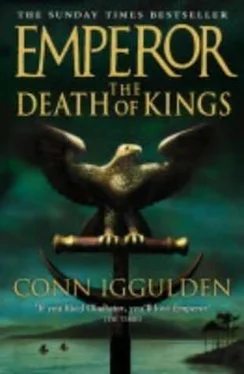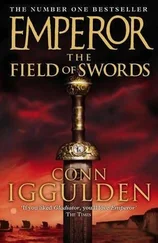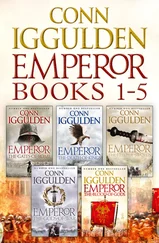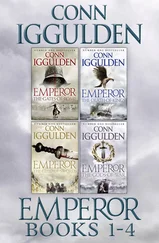“This Caesar, this reckless young man, has shown nothing but disdain for Senate will. Acting alone, he has caused the deaths of hundreds of Roman citizens, many of them veterans of our legions. As I understand it, he assumed an authority he was never granted and behaved throughout as I would expect a nephew of Marius to behave. I call on the body of the Senate to censure this little cockerel-to show our repugnance at his waste of Roman lives and his disregard of our authority over him.”
He resumed his seat with a satisfied grunt, and the Master of Debate stood, looking relaxed. He was a large, florid man with little patience for fools. Though his authority was nominal, he seemed to enjoy controlling the more powerful men of the Senate.
Cinna had risen at Cato's words, his face flushed in anger. The Master of Debate nodded for him to speak, and Cinna swept the rows with his gaze, holding their attention.
“As many of you know, I am related to Caesar through my daughter's marriage,” he began. “I came here not to speak in his defense, but to take part in what I expected to be our just and proper congratulation.” A wave of muttering from Cato's supporters prevented him from carrying on for a moment, but he waited with icy patience until they subsided.
“Should we not congratulate a man who broke one of the enemies of Rome? Mithridates lies dead, his army dispersed, and some of you speak of censure ? It is beyond belief. Instead of counting the lives of his men lost in a battle against a larger force, think instead of those innocents who live because Mithridates was crushed. How many more of our people would have died by the time our cautious legions finally edged close enough to engage the enemy? By the reports, it seems as if they might never have reached the Greek forces at all!”
Another storm of muttering broke out, with jeers and shouts rising over the rest. Many of the senators on both sides rose to speak and fidgeted as they waited. The Master of Debate caught Cinna's eye and raised his eyebrows in question. Cinna gave way with ill grace and resumed his seat.
Senator Prandus stood at Cato's side. He was a tall, spare figure next to the bulk of his patron, and he cleared his throat slightly as he was signaled to speak.
“My son Suetonius was one of those taken by pirates with this Caesar. I have his reports on which to base my opinions, and they point to the danger of this Roman to everything we stand for. He acts without consultation of any kind. He rushes into conflict without a thought for other methods to solve a problem. His first and last answer to everything is blind attack. I have details of executions and torture carried out in his name, unsanctioned by the Senate. He compelled old soldiers into battle for little more than personal glory. I must agree with the honorable Cato that this Caesar should be called here for a just punishment for his actions. We should not forget the allegations of piracy that have been leveled against him by Quaestor Pravitas. If he is commended, as some seem to think would be correct, we may well create another Marius and come to regret our generosity in time.”
Cato pushed a nervous-looking man to his feet. Senator Bibilus almost stumbled as he rose under the pressure of the heavy hands. His face was pale and beads of nervous sweat stood out on his brow. Breaking custom, he began to speak before he had received permission, and his first words were lost in the hoots of derision that followed.
“… should consider the withdrawal of Senate membership,” he said, and gulped saliva from his throat. “Or possibly a ban on holding army rank. Let him be a merchant with the looted gold he has brought back with him.”
As he spoke, the Master of Debate glared stonily at him, and a brief gesture sent Bibilus back to his seat, his face burning with embarrassment. The Master of Debate looked grim and turned to face the opposing benches, clearly determined to redress the balance with his choices. Crassus was given leave to speak. He nodded thanks and stared calmly around the packed rows until there was a proper stillness once more.
“How you do reveal your secret fears!” he snapped. “Another Marius, you say. His nephew! How we must tremble! It sickens me. Did you think our precious Republic could survive without military power? How many of you here have commanded men in successful battles?” His gaze swept the rows, knowing that Cato had served only the two-year minimum to see him up the political ladder. Other heads nodded while Cato stifled a yawn and looked away.
“We have a young man who knows how to lead soldiers,” Crassus continued. “He gathered a small army and routed a force eight or nine times their size. True, he acted without first seeking our approval, but he could hardly have waited a year or two until we had finished discussing it!”
The Master of Debate caught his eye, but Crassus ignored him.
“No, what causes such poisonous spite in some of us is the shameful fact that this young man has shown our choice of legion commanders to be wrong. His success is proof that we did not act with enough energy and speed to defend our possessions in Greece. That is what rankles with these gentlemen. That is the only reason for their anger against him. Let me remind you that he won the oak wreath for his bravery at Mytilene. He is a gifted, loyal soldier of Rome, and it would shame us not to recognize that publicly. I hear Bibilus murmuring about having him stripped of legion rank, and I ask myself, what victories has Bibilus brought to us? Or Cato? And there is Prandus hinting at piracy when he knows the charges were proven idiocy when the full facts came to light. No wonder he skirts such a difficult issue when his own son was one of those accused! We should laud Caesar with honors for what he has done.”
“Enough, Crassus,” the Master of Debate said sternly, satisfied he had allowed enough time to repair the outburst by Bibilus. “Both sides of the debate have spoken. We can move on to a vote.”
Those still standing sat down reluctantly, looking around the hall and trying to gauge the result before it had started. Before the vote could begin, the massive bronze doors to the chamber swung open and Pompey entered, causing a new stir of interest. Since the death of his daughter a week before, he had not been seen anywhere near the forum or the Senate, and there were many whispered questions about his tragedy and what would come of it.
The Master of Debate motioned to Pompey, indicating a seat for him in the rows. Instead of sitting, Pompey walked to his place and stood waiting to be recognized.
Sighing, the Master of Debate raised his hand toward him. All noise ceased as every eye fastened on the new arrival.
Cato in particular watched him with glittering intensity, taking in every detail. The daughter's ashes could not have been long in the ground, but no signs of that grief showed on the man's face. He seemed calm as he looked around at the packed benches.
“Forgive my absences and my lateness, Senators. I have buried my daughter,” he said quietly, without a trace of infirmity in his voice. “I make a vow before you that those responsible will regret using the innocent in games of power, but that is a problem for another day.” He spoke reasonably, but those close to him could see every muscle in his shoulders was rigid, as if he held a great rage barely in check.
“Tell me, what is the vote this morning?” he asked the Master of Debate.
“It is to decide censure or approval for the actions of Julius Caesar in Greece,” the man replied.
“I see. How does Cato stand on the issue?” Pompey asked without looking over to the sprawling figure that straightened suddenly in his seat.
The Master of Debate risked a glance at Cato. “He has argued for censure,” he replied, bewildered.
Читать дальше
Конец ознакомительного отрывка
Купить книгу












